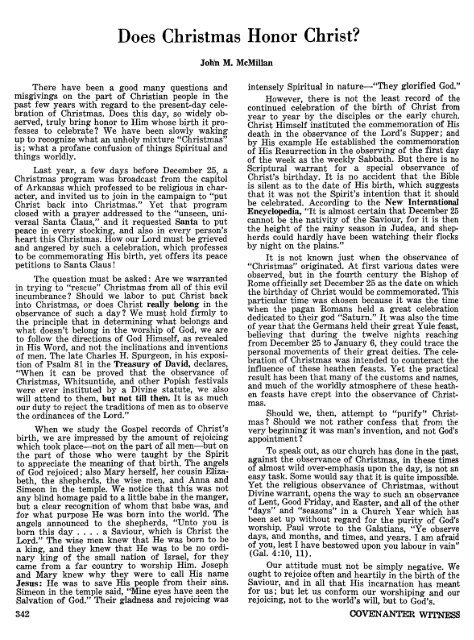Covenanter Witness Vol. 55 - Rparchives.org
Covenanter Witness Vol. 55 - Rparchives.org
Covenanter Witness Vol. 55 - Rparchives.org
Create successful ePaper yourself
Turn your PDF publications into a flip-book with our unique Google optimized e-Paper software.
plains."Does Christmas Honor Christ?John M. McMillanThere have been a good many questions andmisgivings on the part of Christian people in thepast few years with regard to the present-day celebration of Christmas. Does this day, so widely observed, truly bring honor to Him whose birth it professes to celebrate? We have been slowly wakingup to recognize what an unholy mixture "Christmas"is ; what a profane confusion of things Spiritual andthings worldly.Last year, a few days before December 25, aChristmas program was broadcast from the capitolof Arkansas which professed to be religious in character, and invited us to join in the campaign to "putChrist back into Christmas." Yet that programclosed with a prayer addressed to the "unseen, universal Santa Claus," and it requested Santa to putpeace in every stocking, and also in every person'sheart this Christmas. How our Lord must be grievedand angered by such a celebration,to be commemorating His birth,petitions to Santa Claus !which professesyet offers its peaceThe question must be asked : Are we warrantedin trying to "rescue" Christmas from all of this evilincumbrance? Should we labor to put Christ backinto Christmas, or does Christ really belong in theobservance of such a day? We must hold firmly tothe principle that in determining what belongs andwhat doesn't belong in the worship of God, we areto follow the directions of God Himself, as revealedin His Word, and not the inclinations and inventionsof men. The late Charles H. Spurgeon, in his exposition of Psalm 81 in the Treasury of David, declares,"When it can be proved that the observance ofChristmas, Whitsuntide, and other Popish festivalswere ever instituted by a Divine statute, we alsowill attend to them, but not till then. It is as muchour duty to reject the traditions of men as to observethe ordinances of the Lord."When we study the Gospel records of Christ'sbirth, we are impressed by the amount of rejoicingwhich took place not on the part of all men but onthe part of those who were taught by the Spiritto appreciate the meaning of that birth. The angelsof God rejoiced ; also Mary herself, her cousin Elizabeth, the shepherds, the wise men, and Anna andSimeon in the temple. We notice that this was notany blind homage paid to a little babe in the manger,but a clear recognition of whom that babe was, andfor what purpose He was born into the world. Theangels announced to the shepherds, "Unto you isborn this ....day a Saviour, which is Christ theLord."The wise men knew that He was born to bea king, and they knew that He was to be no ordinary king of the small nation of Israel, for theycame from a far country to worship Him. Josephand Mary knew why they were to call His nameJesus: He was to save His people from their sins.Simeon in the temple said, "Mine eyes have seen theSalvation of God." Their gladness and rejoicing was342intensely Spiritual in nature "TheyglorifiedGod."However, there is not the least record of thecontinued celebration of the birth of Christ fromyear to year by the disciples or the early church.Christ Himself instituted the commemoration of Hisdeath in the observance of the Lord's Supper; andby His example He established the commemorationof His Resurrection in the observing of the first dayof the week as the weekly Sabbath. But there is noScriptural warrant for a special observance ofChrist's birthday. It is no accident that the Bibleis silent as to the date of His birth, which suggeststhat it was not the Spirit's intention that it shouldbe celebrated. According to the New InternationalEncyclopedia, "It is almost certain that December 25cannot be the nativity of the Saviour, for it is thenthe height of the rainy season in Judea, and shepherds could hardly have been watching their flocksby night on theIt is not known just when the observance of"Christmas"originated. At first various dates wereobserved, but in the fourth century the Bishop ofRome officially set December 25 as the date on whichthe birthday of Christ would be commemorated. Thisparticular time was chosen because it was the timewhen the pagan Romans held a great celebrationdedicated to their god "Saturn." It was also the timeof year that the Germans held their great Yule feast,believing that during the twelve nights reachingfrom December 25 to January 6, they could trace thepersonal movements of their great deities. The celebration of Christmas was intended to counteract theinfluence of these heathen feasts. Yet the practicalresult has been that many of the customs and names,and much of the worldly atmosphere of these heathen feasts have crept into the observance of Christmas.Should we, then, attempt to "purify" Christmas? Should we not rather confess that from thevery beginning it was man's invention, and not God'sappointment ?To speakout, as our church has done in the past,against the observance ofChristmas, in these timesof almost wild over-emphasis upon the day, is not aneasy task. Some would say that it is quite impossible.Yet the religious observance ofChristmas, withoutDivine warrant, opens the way to such an observanceof Lent, Good Friday, and Easter, and all of the otherin a Church Year which hasbeen set up without regard for the purity of God's"days"and"seasons"worship. Paul wrote to the Galatians, "Ye observedays, and months, and times, and years. I am afraidof you, lest I have bestowed upon you labour invain"(Gal. 4:10, 11).Our attitude must not be simply negative. Weought to rejoice often and heartily in the birth of theSaviour, and in all that His incarnation has meantfor us ; but let us conform our worshiping and ourrejoicing, not to the world's will, but to God's.CX)VENANTER WITNESS
















